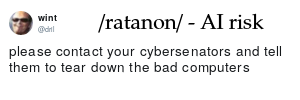Honestly, I think this book is basilisk-shaped. If the thesis is false, then it doesn't matter. If it's true, then sharing it and offering supporting arguments is basically malicious. (I'm not comparing severity of consequences or truthfulness of the argument to the basilisk, just its hazardous shape.)
>Humans routinely engage in self-deception, because this behavior is useful for accomplishing social goals.
Okay great, Robin. I'm glad my brain has this advanced capability that's helping me all the time without me even noticing.
>As evidence, here's a catalog of self-deceptions you personally might engage in, and here's why these selfish reasons are more likely to be the real reasons for the corresponding behaviors.
Fuck OFF. If the self-deceptions help me, then I want to remain deceived. Seriously, why would you write this?
It doesn't even have a spooky warning name, like "basilisk" or "Tome of Forbidden Knowledge". It's distilled infohazard packaged in some cheap book whose title is an autistic mangling of a barely-related English idiom.
